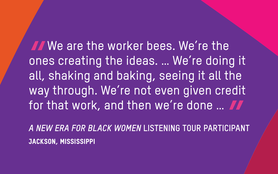Our world is shaped by narratives, yet we rarely take the time to question how these narratives are shaping our future. Black women deserve a narrative that reflects their resilience and contribution to society.
Narratives date back to the beginning of time. They were passed down in stories and act as a thread that connect us to history. Narratives don’t just live in our heads, they act as heuristics or shortcuts, and guide us in times that we have to react quickly or make a swift decision. These narratives can be simple - like avoiding digesting watermelon seeds so a watermelon doesn’t grow in your belly. These narratives can also be complex such as informing your decision to cross the street because a person approaching feels unsafe. Narratives, consciously and subconsciously, help build our worldview and inform our decision-making. Ultimately, narratives impact our realities, and therefore, impact our policies.
Narratives are applied widely, and sometimes are associated with certain demographic groups. What narratives do we hear about Black women? Historically, they have been a mixture of stereotypes and public perceptions. Dating back to consequential ideals from slavery, the Mammy is known to be nurturing and willing to suppress her own needs for the fulfillment of others. The Angry Black Woman is seen as aggressive and dramatic, oftentimes upset for no reason. The Jezebel is seen as seductive and promiscuous, unable to be satisfied. The Welfare Queen, popularized by former President Reagan, is lazy and dependent on government assistance, always waiting for a handout.
There is no other demographic group that is constrained by such rigid, pervasive stereotypes. While these narratives originated decades ago, they are very much still alive today. We see them applied every day in media and public discourse from Angel Reese on the basketball court to Rep. Jasmine Crockett in Congress. They signal to society that Black women are not worthy of protection, security, and safety, which is reflected in the policies that fail to protect Black women. Because these stereotypes are embedded in the system, they are hard to overcome.
Many narratives were built by slavery, but maintained by white supremacy. These narratives don’t get passed down through the generations by happenstance; there is persistent work done to uphold these white supremacist narratives. To change the outcomes for Black women and marginalized people, we must share the reality and shift the narrative.
What do we know about Black women? Black women are educated, and obtaining higher education at rapid rates. Black women are hardworking and make up the highest labor force participation rate of all women. Black women are the heads of their households, with Black households having the highest share of households headed by women (60%). Black women are breadwinners, with 80% of Black mothers acting as the sole earner or a large portion of the household income. Black women are civically engaged and show up with significantly high voter turnout rates.
Negative stereotypes are hurting Black women and resulting in detrimental outcomes such as health disparities, barriers to housing, and generational poverty.
“Too many of us are poor. Too many of us don’t have healthcare. Too many of us are or have been incarcerated. Too many of us are struggling to gain a post-secondary education or are buried under college debt. Too many of us have been assaulted. Too many of us are carrying the weight of other people’s problems. The sisters are still alright – intrinsically valuable and human – and we are still struggling” - Tamara Winfrey Harris, The Sisters are Alright: Changing the Broken Narrative of Black Women in America
Now, we are seeing Vice President Kamala Harris being attacked by these narratives due to her recent endorsement as the presumptive 2024 Democratic Presidential candidate. Despite her extensive and successful experience as District Attorney of San Francisco, Attorney General of California, and U.S. Senator, a GOP congressman called her a “DEI hire.” After raising an historic $81 million on the first day of her campaign, this congressman and many others immediately began to minimize her by using racial epithets. These racial narratives hurt Black women across the spectrum, from low-wage workers to the next Democratic presidential nominee. Despite the attacks and political unrest, Kamala Harris is showing up.
Despite the failure of institutions and societal expectations upon Black women, they consistently show up. The narratives around Black women should reflect this reality. Since the foundation of the United States, Black women have built the economy on their labor and care work. Still today, Black women continuously create fellowship and pour into their communities in the same way.
Shifting the narrative to reflect the reality will help to build confidence and respectfully honor Black women and girls. Furthermore, a change in perspective amongst the general public will ultimately translate to a change in policy preferences that will lead to better outcomes for Black women. Let’s tell the truth about Black women. Let's give them their flowers by allocating space to tell their own truth and bloom.



